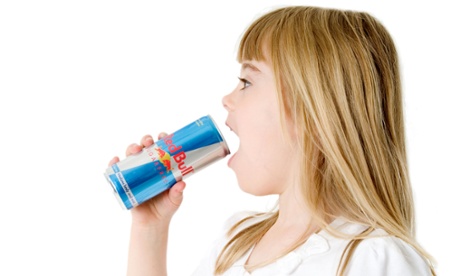
The energy drink market is booming and children are among the consumers. Many are ignoring warning labels and opting for energy drinks, often marketed as a stamina enhancing, natural part of a young person’s high-octane lifestyle.
Music, gaming and extreme sports; this is what greets you on the website of the best-selling energy drink in the world.
Red Bull’s marketing message is clear: this sugary drink with stimulating effects and trademark ingredients including caffeine and taurine “gives you wings”. Gravity-defying sports professionals drink the soda that enhances your performance and helps push the boundaries of what you think you can do. Or so it will have you think.
“Many professional and amateur athletes around the world use Red Bull as an important part of their training and competition routines,” says a Red Bull spokesperson.
Monster Energy, part-owned by Coca-Cola, is the UK’s fourth best-selling energy drink (after Red Bull, Lucozade Energy and Lucozade Sport) and employs a similar formula, only here scantily clad women and heavy metal are added to the mix. The edgy, sporty, celebrity-like lifestyle portrayed by both brands is one many young men dream of.
Gavin Partington, director general at the British Soft Drinks Association (BSDA) says many energy drinks are targeted at men between the ages of 18 and 24. But it isn’t just adult men who are being drawn in. These marketing messages also appeal to children, a factor that has led to heavy criticism of beverage companies for failing to protect young people.
According to a survey by the UK’s largest teachers’ union NASUWT, some 13% of teachers in the UK say caffeine and high-energy drinks drive poor pupil behaviour. Nutritionist and Action on Sugar campaign director Katharine Jenner takes issue with the way these beverages are marketed.
“It is absolute nonsense … They are unfairly marketed, making claims about performance enhancing. I think that is no longer about [free] choice; that’s influencing people’s choice, and it’s no longer a fair game.”
Jenner says energy drink companies are trying to get people addicted to their products, which can contain a child’s full daily sugar intake and the caffeine equivalent of a cup of coffee. “It’s about hooking them young,” she says.
Claire Jones (not real name) is a science teacher at a secondary school in northern England. She worries about an emerging caffeine culture among pupils.
“I have asked some pupils why they drink energy drinks. The worrying answer was ‘it was on offer’, which makes me think many of these drinks are being bought by the pupils themselves and marketed suitably to entice them.
“I wouldn’t link poor behaviour directly to energy drink consumption … but caffeine is addictive; it should not be marketed and given freely to school-age children,” she says.
As of December 2014, energy drinks cannot be marketed to under 16s and must carry a label saying they are not recommended for children. Partington explains: “Different physiques handle caffeine in different ways, that’s why it’s appropriate to have labelling.”
Jenner, however, says responsible selling would be to not make them available to under 16-year-olds at all.
Last year UK supermarket chain Morrisons trialled a 16-year-old age limit but, despite receiving support from schools and teachers, the scheme came to an end in 2015.
“We found during the pilot that some over 16-year-olds had difficulty legitimately buying energy drinks because they don’t routinely carry proof of age,” a spokesperson said.
Tesco, currently selling one energy drink at 39p, says it will not impose an age ban but is committed to reducing sugar content in its own-brand soft drinks, including energy drinks.
“A ban is a very heavy-handed approach,” says Partington. “What we can and should do is spell out that these products are not suitable to children in the belief and the hope that parents will understand that and will reinforce good habits.”
NASUWT spokesperson Lena Davies says: “Many parents see these drinks as just a normal soft drink … and they are actually quite different in terms of their composition.”
Science teacher Jones agrees: “Often the parents don’t know what’s right.”
While energy drink sales are increasing nationwide, bottled water is experiencing significant growth too, up 10% in the UK . “There’s no doubt where consumers are going,” says Partington. “Consumers are moving to water and low- and no-calorie products.“
But Jenner says information about the dangers of children consuming energy drinks must reach those not already making healthy decisions. “It seems to be that the younger and the more socially deprived you go, the more calories come from sugar-sweetened soft drinks.”
Partington says industry, parents and retailers share the responsibility and that BSDA wants to do what’s “right”. “We want to ensure the products are marketed and promoted in an appropriate way and not designed to appeal to under 16s,” he says.
With children consuming energy drinks, experts agree education is the way forward. Red Bull might give you wings but it doesn’t necessarily protect you from a sugar crash-landing.

